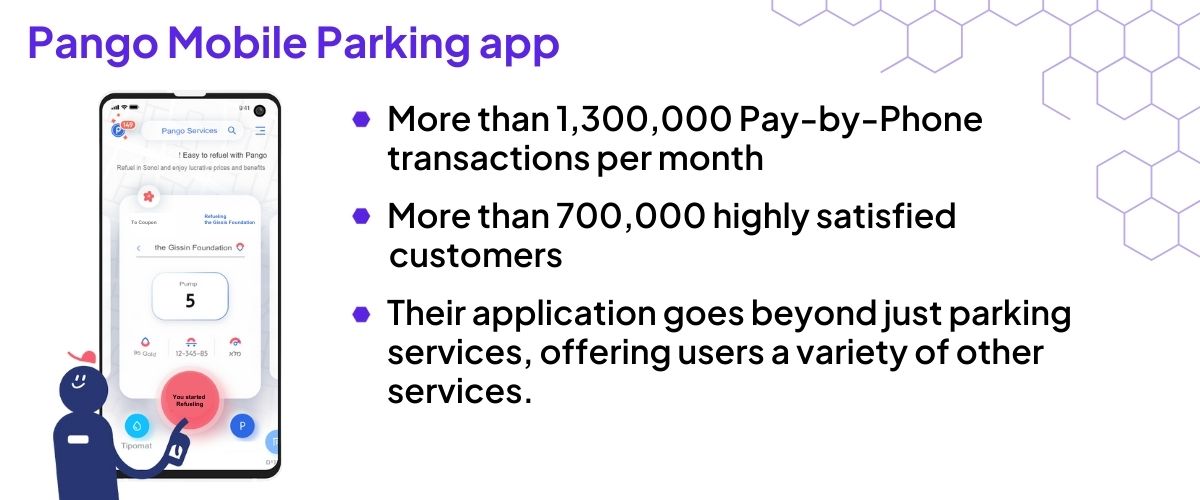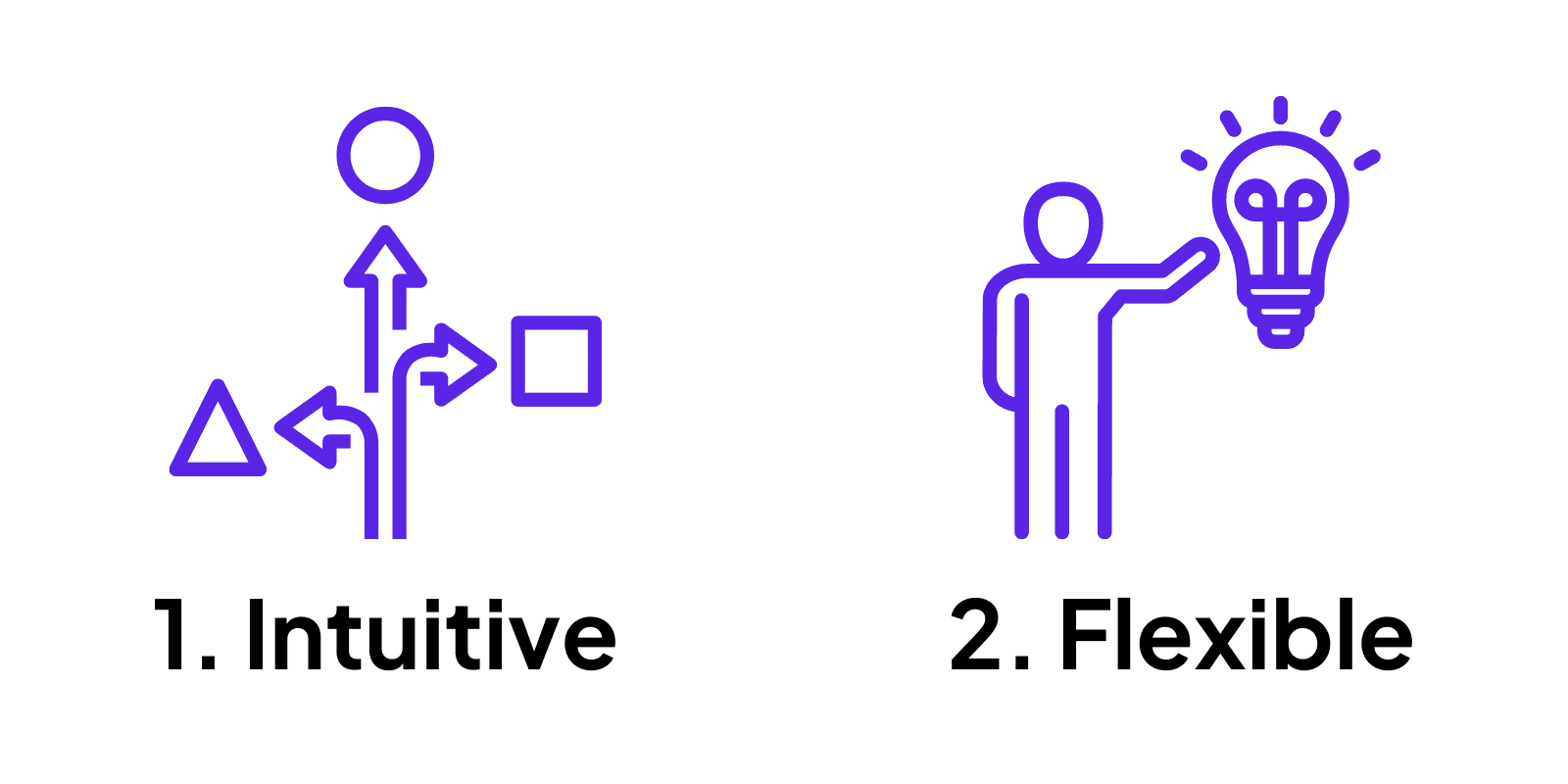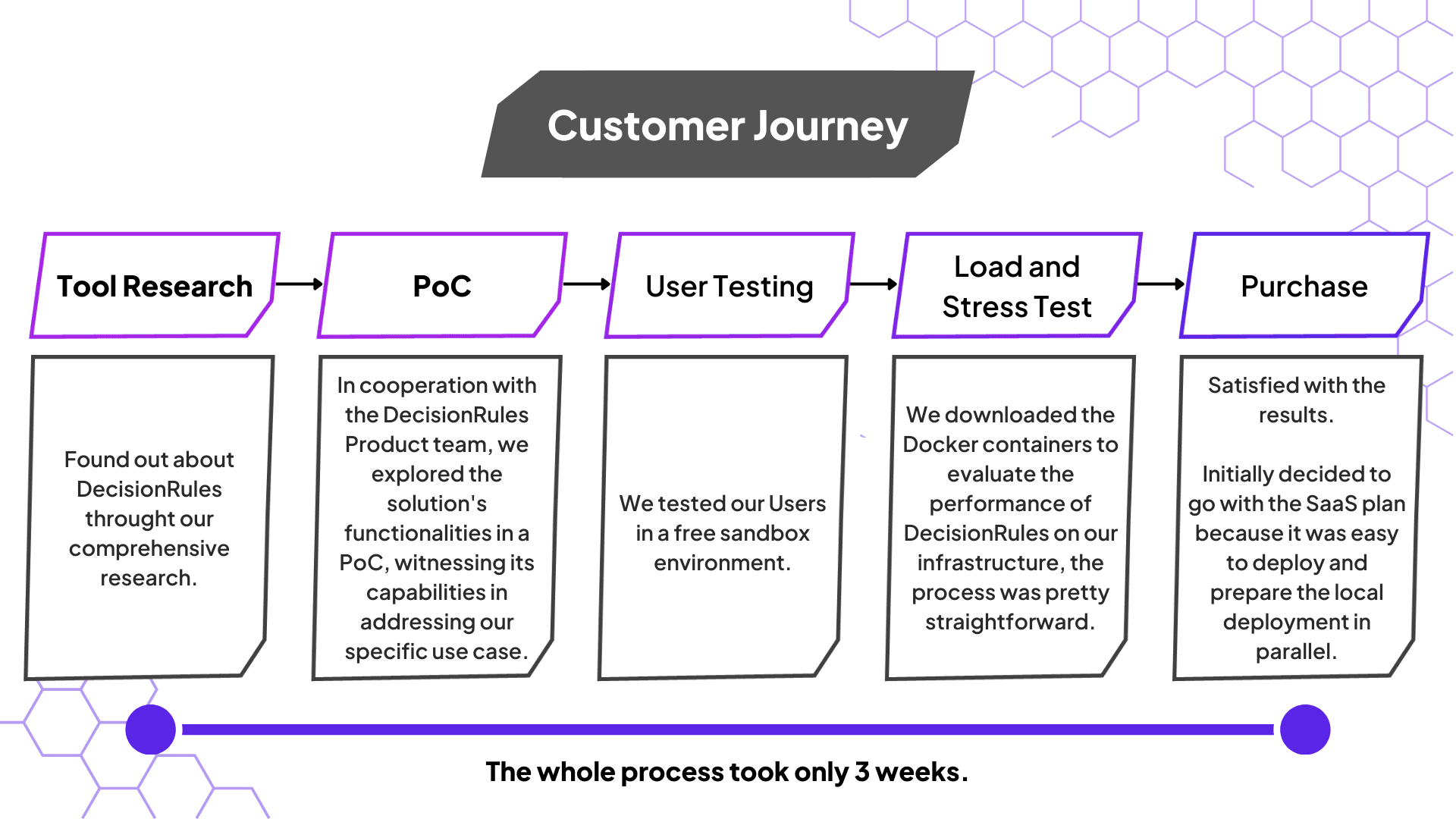Technical Details
Our system architecture is built on a robust orchestration service, with all our code hosted on AWS, utilizing a server-less infrastructure primarily through AWS Lambda. We integrate this setup with the DecisionRules SDK, making synchronous calls via the REST API to interact with the rule engine. This process is inherently event-driven; it activates as a client exits a parking lot. At this point, our system triggers an event, capturing all relevant data, which is then processed by our cloud service. We often enhance this operation by incorporating additional data from our database. This enriched data forms the input model, which we then dispatch to the DecisionRules API. Upon sending this model, we promptly receive a response, completing our process.
How does the Team work with the Tool
The production services team, who are technical people but not developers or engineers, rather first-level support. They are in charge of setting rules for customers using parking lot services. Rules are similar between domains using DecisionRules, however, the location or hour parameters may change, but the rules are more or less the same. There are a couple of guys working in the production services team. There is another team that develops other than benefits a scheduler for Jewish holidays, based on the rule engine. Other than them, product owners also define rules for other domains. The total number of people working directly with DecisionRules is now around 4 or 5.
In what areas does DecisionRules help
1. Increased User Conversion Rate
The conversion rate in parking lots is our baseline for success. Conversion is measured by how many people who received an SMS to use Pango for payment, actually clicked the link and paid. Pango has definitely seen its conversion rate improve on parking lots that use the benefit system powered by DecisionRules.
2. Efficient Rule Actualization
We have the production services team and marketing team using DecisionRules at the moment. We had a summer sale recently for which they were able to quickly implement the specific rules that would determine the appropriate benefits without needing the developers to change hard-coded rules. There is another team that develops a schedule for Jewish holidays, based on the rule engine, as needed. Other than them, product owners also define rules for other domains. Where before we needed to change hard-coded rules, these changes are completed now in a matter of minutes.
Result
"It took our team just a few weeks to have our rules and rule flows up and running with DecisionRules." The implementation was really straightforward and we really appreciate the help provided by the DecisionRules team during the process. We are especially grateful and glad about DecisionRules' prompt response time since this agility continually helps us resolve any issues much more efficiently. Overall, there were a handful of people working on implementation, so the resources and time needed to go live were low. The implementation took an estimated total of 2-3 weeks until it was live.

Lior Gal
Development Group Lead, Pango
About our client:
Industry: Software Development - Parking Application
Estimated company size: +130FTE
Estimated annual Revenue: $11M
Objective: To implement a tool that replaces their internally hard-coded rules, empowering various non-technical personnel to effortlessly edit and manage rules as required, thereby enhancing efficiency in their decision-making processes.

Pango’s flagship product is the Pango Mobile Parking app, which allows users to find parking spaces, manage sessions, and make payments seamlessly from their smartphones. In addition, they offer other comprehensive parking and mobility services and have thus become a market leader and valued partner, contributing to sustainable urban mobility solutions.
In addition to their mobile parking app, Pango offers comprehensive services for parking operators and municipalities, including real-time monitoring, data analytics, and revenue management tools. Pango’s advanced parking management platform enhances operational optimization and efficiency.
Their application goes beyond just parking services, offering users a variety of other services. From using public transportation, and fueling your car, to charging, parking, and car wash services, Pango covers it all. Additionally, they offer services for car insurance, repairs and even towing for when you encounter any difficulties. Pango also facilitates scooter rentals, and a comprehensive map which guides users to locate the services offered within Israel.
Pango also provides payment processing services that, while valuable, do not constitute the core of their business.
Pango is a valued partner for public and private entities, contributing to the development of smart cities and sustainable urban mobility solutions.
Every day Pango processes countless transactions, each demanding swift analysis to determine which benefits customers are entitled to when using their app. In order to assess how to provide benefits to their customers, Pango relies on multiple business rules, which can undergo constant changes due to factors such as special offers, holidays, or other evolving conditions. Their existing system relied on hard-coded rules, and depended on complicated processes from their design to implementation, all requiring the expertise of a specific programming team. Consequently, users of these business rules found themselves unable to manage the necessary changes.
In order to improve timeliness and efficiency, Pango considered creating an in-house rule engine, but their pursuit came to a halt upon discovering DecisionRules. It became evident that developing an in-house rule-engine matching DecisionRules' capabilities would demand resources and time that outweighed the potential benefits for Pango. DecisionRules stood out as the ideal and comprehensive solution for Pango's specific use case, particularly owing to its high-level user interface and advanced capabilities.
The Challenges
Pango’s business model presented them with a set of requirements when it came to the ideal rule engine software, particularly three main areas:
- Discount Eligibility As users leave a space managed by Pango, such as a parking garage or parking space they need to evaluate, based on a multitude of parameters, whether this customer was eligible for a benefit (discount, free credits, etc.), and if so, which particular one; all in a matter of seconds.
- Embracing Flexibility Pango required moving away from hard-coded rules, and finding more flexibility in the functionality so that the non-technical teams could make configurations as needed. And that the non-technical team no longer relied on the dev team to implement their changes.
- Efficient and Powerful with thousands of transactions happening simultaneously, Pango required a powerful and reliable rule engine that processes all these transactions in real-time.
Before and After
Before
Pango was executing a project called Benefits, which aimed to provide their customers with customized discounts for parking and other offers based on specific customer parameters. They had numerous business rules that required coding or configuration within a database. Before DecisionRules was implemented, their non-technical team (marketing and product) would need to ask the development team to make changes to these rules based on business descriptions given by those teams. The entire process for implementing these hard-coded rules was long and required the skills from specific personnel. In other words, it was no easy task.
After
The process now is easily managed by the product team, who can create a decision table, change values as needed, and hit save, and all business rules are updated immediately and ready to be used. The key idea of the DecisionRules implementation was to take the pressure off from the technical personnel, developers, and QA that used to do it before. Pango did not have a diverse capability of benefits before, since each time it was needed, the setup was hard or a code change was needed. Now for instance, they ran a summer sale benefit program that was done completely by the product team, who didn't need the developers at all. Moreover, they had it up and running in a few hours.
Pango checks if you are entitled or not to a discount, and if you are, the output column in DecisionRules describes the type of discount after which they calculate the final price.
Why DecisionRules?

Benefits of DecisionRules:
Intuitive UI
Pango’s primary aim was to provide their non-technical teams with a user-friendly and intuitive interface, a goal seamlessly realized through DecisionRules. This empowered their non-technical personnel to independently create, edit and manage rules.
Ease and Flexibility of Deployment
The deployment strategy has evolved dynamically for Pango. As their needs matured, they seamlessly transitioned from using DecisionRules on the public cloud, to the on-premise deployment. They took control over their operational landscape backed by the DecisionRules Support Team.
Examples of the Application
So how does it all work? Let’s say a customer enters a parking lot, and upon exit some time later, opens the Pango app to check out and pay. At this point Pango wants to evaluate what the customer owes, as based on certain parameters the customer may be entitled to discounts or other benefits. These benefits may be a percentage, a fixed price, or an API call going to the main pricing calculator. At this point Pango will use DecisionRules, and these customer parameters are examined to determine whether and which benefit the customer can obtain. The price is then calculated outside DecisionRules, and a final parking price is sent to the customer. All in a matter of seconds.
Pango checks if you are entitled or not to a discount, and if you are, the output column in DecisionRules describes the type of discount after which they calculate the discount themselves. Pango even has a cool use case, a joint venture with Tel Aviv city, which wants to encourage people to use the bus. So they have set up big parking lots outside the city. If customers park there and use public transport, they can pay for the public transport with Pango, which entitles them to benefits as a reward. This process also works through the rule engine. They emit an API call from the rule engine to the service that provides public transportation, and check if they had a fare in the last few hours, and if affirmative, it applies a parking discount.
“When we found DecisionRules, we recognized that it was a complete product fitting to our use case” - Lior
For Pango, the value of a tool such as DecisionRules was evident from the very first interactions. The first goal in selecting a rule engine was to find something that was intuitive and would be easily managed by their marketing and product teams.
“DecisionRules’ functionality when it comes to creating, editing, and managing rules allowed our teams the confidence to work independently of the IT and development teams.
One of the capabilities that we truly appreciate is also the possibility of maneuvering between deploying the tool on the public cloud and being able to later migrate it to our own servers. This feature was extremely attractive to us.
Initially, our purpose was to build our own in-house tool. However, as we conducted our research, we determined that DecisionRules was a highly complex tool especially given it has a high-level UI. Thus we determined that they were the perfect rule engine for our needs.
We are very pleased and satisfied with DecisionRules and our ability to simplify and speed up complex decision-making processes. Our teams have all been able to learn its functionality quite intuitively. It is very complex, which allows us flexibility in our day-to-day operations”.

Implementation
"Our teams are extremely satisfied with the performance of DecisionRules as our rule engine. We have seen real positive results mainly in our conversion rate, which is a marker of our success. Additionally, the dependence on our development teams has greatly reduced which has translated into more time available to spend on other projects within the company. Furthermore, we are able to cut down the overall time spent in developing rules and have been afforded the capacity to increase the amount of rules we can create. We appreciate the efficiency DecisionRules gives us. We are looking forward to scaling the tool and expanding its use to other domains and other use cases."

Lior Gal
Development Group Lead, Pango

Bracey Parr
Head of Sales
